Many Rohingya had already escaped. Communal clashes with Buddhists in Rakhine prompted 140,000 Rohingya to leave their homes in 2012. Thousands have since died either at sea or in brutal jungle camps run by people smugglers.
A United Nations report released this year detailed what happened to those that stayed. The report described mass killings and gang rapes by the armed forces in actions that “very likely” amounted to crimes against humanity.
The current wave of violence is the worst so far, and rights groups have said it could constitute a final campaign to rid Myanmar of the Rohingya. Satellites have recorded images of whole villages burnt to the ground.
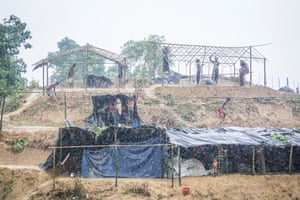
All UN aid work in the conflict area has been blocked. Aung San Suu Kyi’s administration, which did not immediately respond to a request for comment, has said it is fighting “extremist terrorists” who are burning their own villages. Accounts of cruel sectarian attacks by Rohingya militants on Hindus and Buddhists in Rakhine have also surfaced. Around 26,000 non-Muslims have been displaced in the violence.
The subsistence farmers of Tula Toli, who spent their lives growing rice and chillies, said there were no militants in their village when the army attacked.
Here are their stories:
Khaled Hossein, 29, labourer
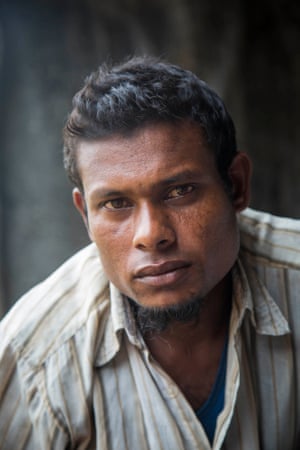
Three days before the massacre, Hossein said about 90 soldiers ordered the village’s several hundred residents to an area east of the settlement, a place locals call “the sands” for its infertile ground.
“Their leader had two stars on his shoulder. He told us: ‘Rumours are being spread around by people in the village that soldiers have been killing people in Rakhine. But you should all keep farming and fishing. The one thing we ask is that if you see soldiers, you don’t run away. If you run, we will shoot.’
“After the speech, the soldiers went from house to house. They were with [local Rakhine Buddhists] and took everything they could find that was valuable: gold, cash, clothes, potatoes and rice. They smashed up houses of three or four people they said had been spreading rumours. They were looking for fighters. The Buddhists had told them about fighters, but there were none there.”
Petam Ali, 30, rice distributor
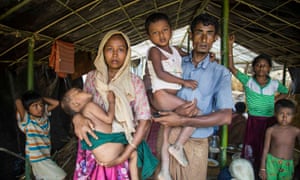
A day before the attack, people from a village across the river called Dual Toli swam over to escape the army. More than 10 died in the river, according to Petam Ali, who sheltered some of the displaced in his family home. They watched their village burn from across the river.
At 3.30am the next day, Ali heard shooting but was not sure of the direction.
“I live on the north side of the village and the army had crossed the river further north and were marching down. I left my family to run out to the jungle to try and spot the soldiers. We waited until 8am and then they moved in, wearing dark green clothes. All of them were on foot.
“I ran back to get my family, but we were too rushed and my grandmother was too old to run. From the forest, we watched them burn our house. It was the first in Tula Toli to be burned.”
Ali’s home, an eight-bedroom wooden structure that he built with his three brothers for 16 members of their extended family, went up in flames fast. Its roof was covered in straw and leaves.
“The soldiers used rocket-propelled grenades, and they set fire to the houses with matches. Once they had gone past, I went back. All the houses were burned. In the road, I saw a dead man I recognised called Abu Shama. He had been shot in the chest. He was 85.”
In the ruins of his house, Ali saw the singed and decapitated corpse of his grandmother. “Her name was Rukeya Banu. She was 75. When I returned to the jungle, I described the whole incident to the rest. They burst into tears. We walked for three days.”
Kabir Ahmed, 65, rice farmer
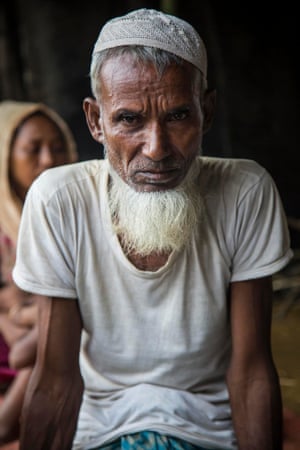
“When I heard the army attacking to the north, I jumped into the river,” said Kabir Ahmed. “My two sons came with me. They are 10 and 12.”
Eight members of his family died, he said, and two of his other sons who are unaccounted for.
“They threw the children into the river. My three-year-old granddaughter, Makarra, and Abul Fayez, my one-year-old grandson. I was hiding on the south side of the river. They gathered everyone together and told them to walk away. Then they shot them.
“We were on hills, hiding behind trees. In the evening, they collected all the bodies on the river bank, dug into the sands and burned them. It happened 40 metres away from me, on the other side of the river. They are buried two to three metres from the riverside.”
Zahir Ahmed, 55, rice farmer (Kabir’s brother)
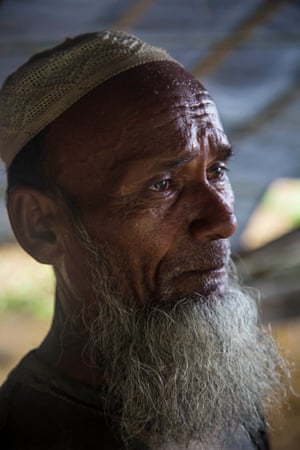
When the army arrived, Kabir Ahmed’s brother, Zahir, was also down by the river but in another spot. His son ran out of their home out in a panic.
“‘Leave us!’ he shouted. I jumped into the river and swam to the other side.
“I waited in the jungle, listening to the military firing. I was right next to the water. My son had gone to save other members of the family.” But he says all were killed.
He starts to count on his fingers those who died: “My wife, Rabia Begum, 50; my first son, Hamid Hassan, 35; his daughter, Nyema, two to three, and his son, Rashid, six to seven months; my second son, Nour Kamel, 12; my third son, Fayzul Kamel, 10; my fourth son, Ismail, seven; my eldest daughter, Safura 25; her husband, Azhir Hassan, 35; my second daughter, Sanzida, 14; my third daughter, Estafa, six; my fourth daughter, Shahina Begum, five; my sixth daughter, Nour Shomi, two to three; my seventh daughter, Hasina, six months old.
“I waited for five hours and then left.”
Mohammed Idriss, 35
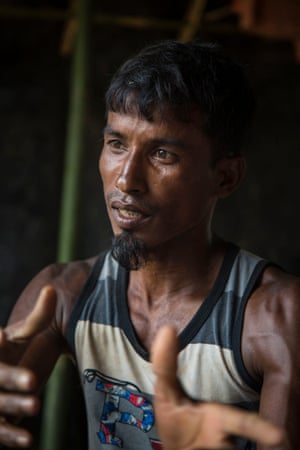
In Bangladesh, the refugees from Tula Toli have made camp on hills that were empty just a few days before. Several thousand Rohingya have felled the trees, levelled out the beige mud and erected tents using sliced bamboo frames and black tarpaulin bought in the market.
All are hungry, and hundreds mob the rickety open-back trucks that local mosques have deployed to hand out donated clothes and food. For fear of being overwhelmed, volunteers throw shirts and trousers into the heaving crowd as they slowly drive along.
Children sleep on the mud in tents, their parents looking on anxiously, worried about flu or diarrhoea. At a clearing nearby, liquid excrement soaks the ground.
When heavy rains arrive, Tula Toli’s displaced shower in the open. Women and children hold dented metal pots at the side of the tent to collect fresh water. Thousands have come to these hills, but the area is almost entirely absent of any belongings. Many fled in terror and few made it out of Myanmar with anything.
Mohammed Idriss lived on the western side of Tula Toli, which borders an area thick with trees and he was able to collect some things before leaving. He holds up a white sack that has two large holes in it.
“I had a bag filled with oil, sugar, flour, 10,000 kyat, rice – things I had taken from the house when we left. When we got to the Naf river [the Bangladesh border], the Myanmar army started shooting.
“I jumped into the river and then hid behind a sandbank. The soldier came and shot at the bag, opened it and took everything. Once we got to the Bangladesh border, the guards told us to head here.”
He says he carried the bag for three days during the 10-mile trek through the trees and hills from Tula Toli.
At camp, Idriss gets a phone call to a dusty mobile, being charged by a cheap solar panel someone found in the market. On the line was another Rohingya refugee near the border. They had found a woman with a gunshot wound to her arm who matched the description of his missing sister.
“They thought she might have been Rabia, but she wasn’t,” he said. “We’re not sure if she was killed or not. We are hoping.”
Since you’re here …
… we have a small favour to ask. More people are reading the Guardian than ever but advertising revenues across the media are falling fast. And unlike many news organisations, we haven’t put up a paywall – we want to keep our journalism as open as we can. So you can see why we need to ask for your help. The Guardian’s independent, investigative journalism takes a lot of time, money and hard work to produce. But we do it because we believe our perspective matters – because it might well be your perspective, too.
I appreciate there not being a paywall: it is more democratic for the media to be available for all and not a commodity to be purchased by a few. I’m happy to make a contribution so others with less means still have access to information.Thomasine F-R.
No comments:
Post a Comment